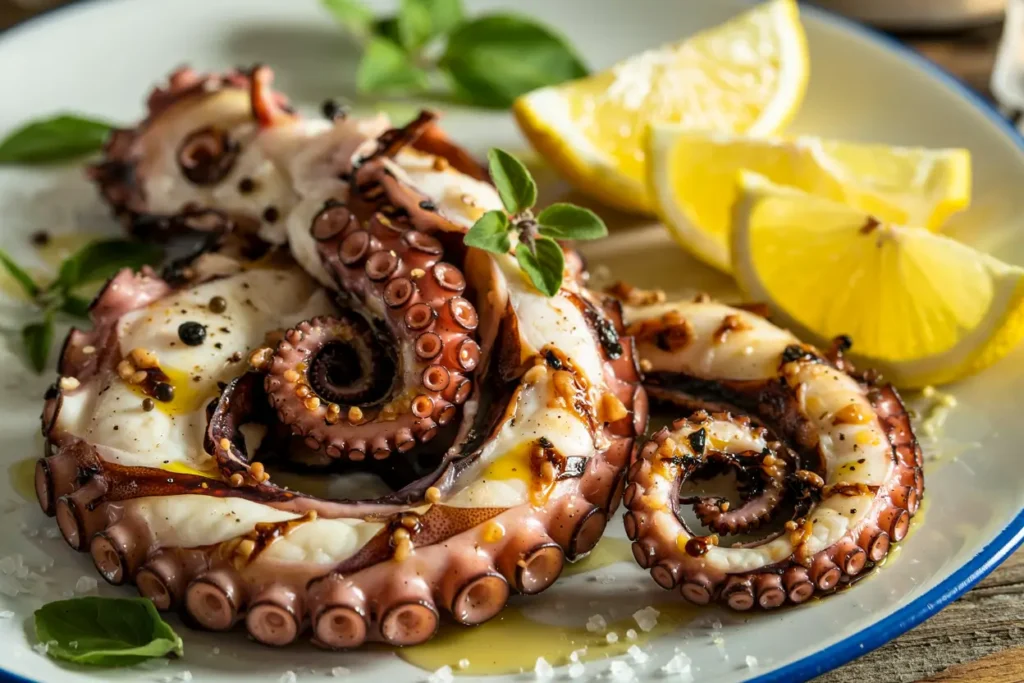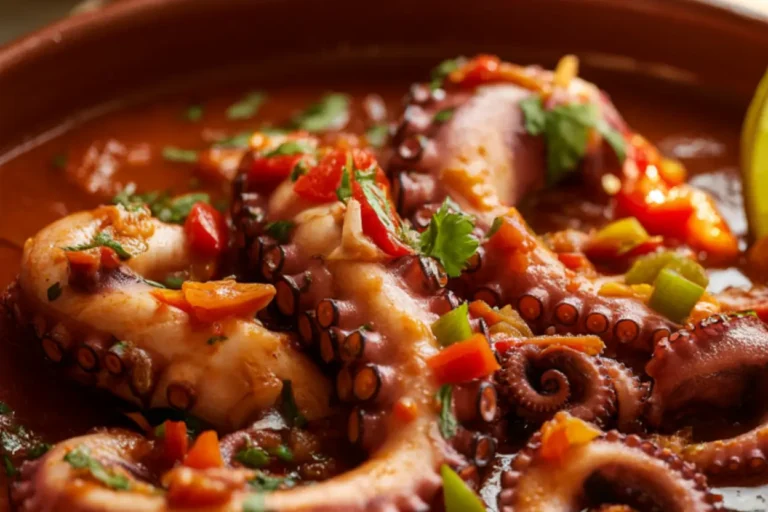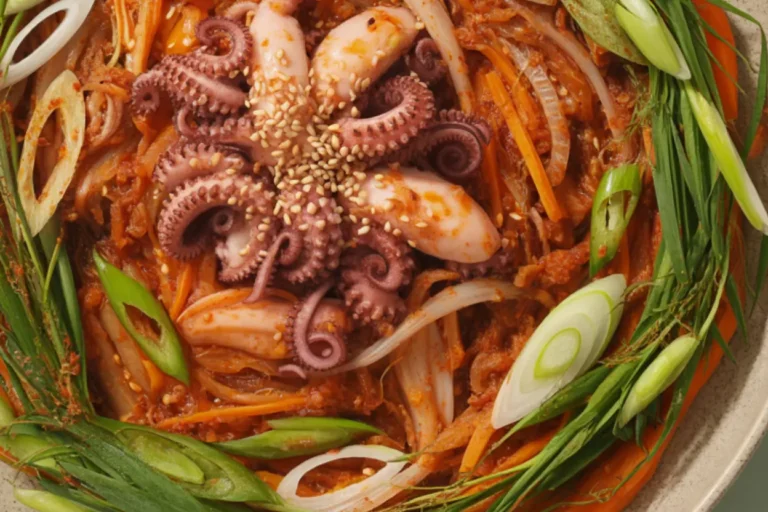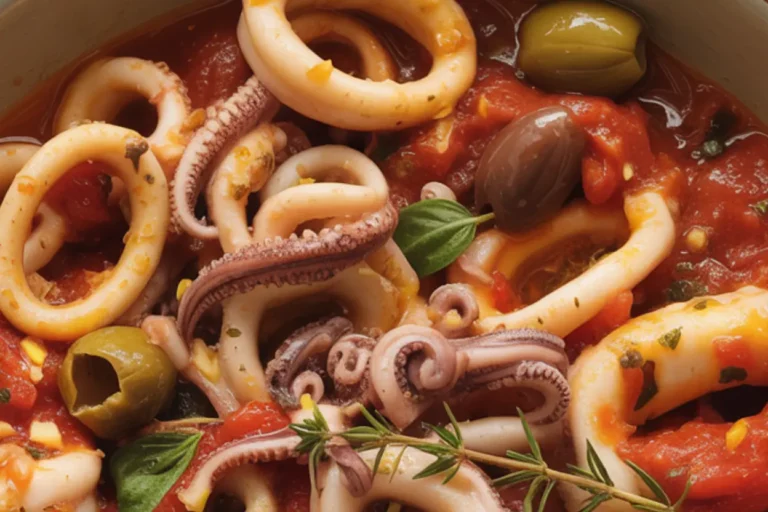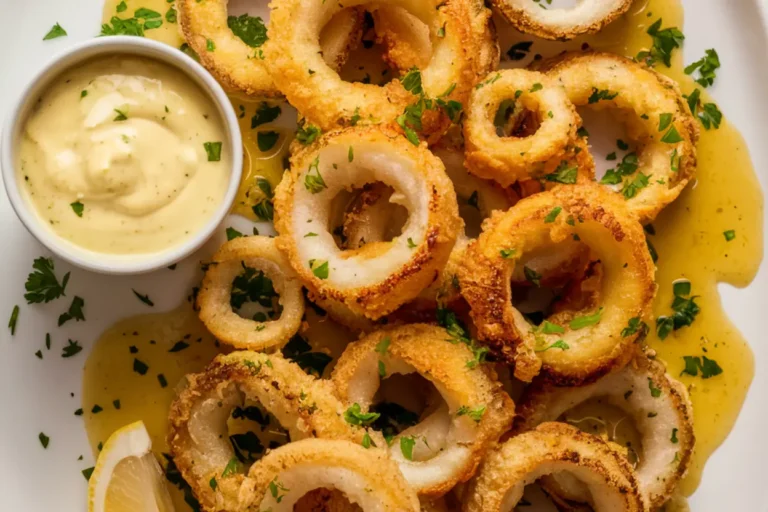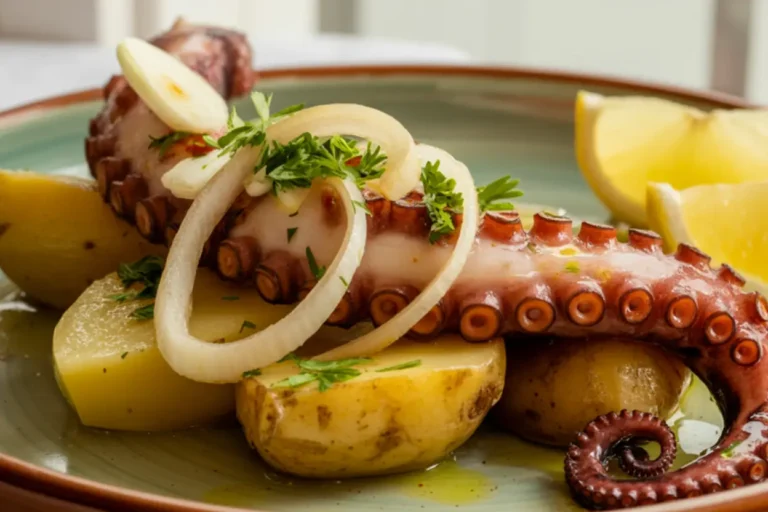Grilled Octopus with Lemon Recipe: How to Master in 4 Steps
Table of Contents
Perfectly grilled octopus is one of those dishes that seems impossibly difficult to recreate at home. Many people believe it’s a delicacy best left to professional chefs, but I’m here to tell you that creating tender, flavorful Grilled Octopus with Lemon is absolutely achievable in your own kitchen. With my simple 4-step method, you’ll be serving up restaurant-quality octopus with Mediterranean flair that will impress even your most discerning dinner guests.
Thank you for reading this post, don't forget to subscribe!How to Make Grilled Octopus with Lemon:
Quick Overview
Grilled Octopus with Lemon is a Mediterranean classic that transforms the intimidating cephalopod into a tender, smoky delicacy with bright citrus notes. What makes this dish so special is the contrast between the slightly charred exterior and the tender, meaty texture within. The clean, simple flavors of olive oil, garlic, and lemon allow the natural sweetness of properly prepared octopus to shine through.
While this recipe does require some patience, the active cooking time is surprisingly minimal. The total preparation time is about 2-3 hours, with most of that being hands-off simmering time. The actual grilling takes just 5-7 minutes, making this perfect for entertaining since the pre-cooking can be done well in advance. The result is a show-stopping dish that looks impressive but follows a straightforward technique that even novice cooks can master.
The Ingredients I Use to Bring My Grilled Octopus with Lemon to Life
For the octopus preparation:
- 2-3 lb (1-1.5 kg) fresh or frozen whole octopus, cleaned
- 1 cup dry white wine
- 1 onion, quartered
- 4 cloves garlic, smashed
- 2 bay leaves
- 1 tablespoon black peppercorns
- 1 lemon, halved
- 1/4 cup white vinegar
- 2 tablespoons kosher salt
For the grilling marinade:
- 1/3 cup extra virgin olive oil
- 4 cloves garlic, finely minced
- Zest of 1 lemon
- 2 tablespoons fresh lemon juice
- 2 tablespoons fresh oregano, chopped (or 2 teaspoons dried)
- 1 tablespoon fresh thyme leaves
- 1 teaspoon red pepper flakes (adjust to taste)
- 1 teaspoon kosher salt
- 1/2 teaspoon freshly ground black pepper
For serving:
- 2 lemons, cut into wedges
- 2 tablespoons high-quality extra virgin olive oil for drizzling
- Flaky sea salt (such as Maldon)
- Fresh oregano or parsley leaves for garnish
Optional ingredients:
- 1 tablespoon capers, rinsed and roughly chopped
- 1/4 cup Kalamata olives, pitted and halved
Step-by-Step Instructions
Step 1: Prepare and Tenderize the Octopus
- If using frozen octopus, thaw completely in the refrigerator overnight. Rinse the octopus thoroughly under cold water, checking for any remaining parts of the beak (the hard center part where the tentacles meet) and removing if necessary.
- In a large pot, combine the white wine, quartered onion, smashed garlic cloves, bay leaves, black peppercorns, lemon halves, white vinegar, and kosher salt. Pour in enough water to fill the pot roughly halfway.
- Bring the liquid to a simmer over medium-high heat. Once it reaches a simmer, lower the heat to keep it at a gentle simmer.
- Now for a traditional technique: holding the octopus by the head, dip the tentacles into the simmering liquid 3 times, holding them in the liquid for about 5 seconds each time. You’ll notice the tentacles begin to curl—this helps prevent them from curling too tightly during cooking.
- After the third dip, gently submerge the entire octopus in the simmering liquid. The temperature should remain at a gentle simmer, never a rolling boil, as this can toughen the meat.
- Cover the pot with a lid slightly ajar and simmer gently for 45-90 minutes, depending on the size of your octopus. Check for doneness by inserting a sharp knife into the thickest part of a tentacle—it should go in smoothly, much like testing a cooked potato.
- Once tender, turn off the heat and allow the octopus to cool in the cooking liquid for about 30 minutes. This helps the octopus absorb more flavor and prevents it from drying out.
- Remove the octopus from the liquid and pat dry with paper towels. At this point, you can either proceed to the next step or refrigerate the octopus for up to 24 hours before grilling.
Step 2: Create the Marinade and Prepare the Octopus
- In a medium bowl, whisk together the olive oil, minced garlic, lemon zest, lemon juice, oregano, thyme, red pepper flakes, salt, and pepper.
- If the octopus has cooled, you’ll need to separate the tentacles from the head. Using a sharp knife, cut between each tentacle where they join at the center. Depending on what you’re working with, you can also cut the head into pieces or discard it (though the head is edible and delicious when prepared properly).
- Place the octopus pieces in a large, shallow dish or resealable plastic bag and pour the marinade over them. Ensure every piece is thoroughly coated with the marinade.
- Allow the octopus to marinate for at least 30 minutes at room temperature, or up to 2 hours in the refrigerator. If refrigerating, bring back to room temperature about 30 minutes before grilling.
Step 3: Master the Grilling Technique
- Preheat your grill to high heat (about 450-500°F/232-260°C). Clean the grates well and oil them lightly to prevent sticking.
- Remove the octopus pieces from the marinade, letting the excess drip off but not wiping it away completely. Reserve the marinade for basting.
- Place the tentacles on the hot grill and cook for 3-4 minutes on each side, or until nicely charred with distinct grill marks. The tentacles will curl even more as they cook.
- During grilling, brush occasionally with the reserved marinade for added flavor and to prevent drying out.
- The octopus is ready when it has a nice char on the outside but is still tender. Be careful not to overcook, as it can quickly become tough. Since the octopus is already fully cooked from the simmering process, you’re essentially just heating it through and adding smoky char.
Step 4: Serve with a Final Flavor Enhancement
- Transfer the grilled octopus to a serving platter.
- Immediately drizzle with high-quality extra virgin olive oil and squeeze fresh lemon juice over the top. The hot octopus will absorb these flavors beautifully.
- Sprinkle with flaky sea salt and garnish with fresh herbs. If using, scatter the capers and Kalamata olives around the dish.
- Serve immediately with additional lemon wedges on the side for guests to add more citrus to taste.
- For an authentic Mediterranean presentation, serve the octopus slightly warm or at room temperature rather than piping hot—this allows the flavors to fully develop.
What to Serve Grilled Octopus with Lemon With
Grilled Octopus with Lemon works beautifully as an appetizer or main course. Here are some perfect pairings:
Mediterranean-Style Accompaniments:
- Greek horiatiki salad with tomatoes, cucumbers, red onions, feta, and Kalamata olives
- Crusty bread, especially a rustic sourdough or ciabatta, drizzled with olive oil
- Simple roasted potatoes with oregano and lemon
- Grilled vegetables like zucchini, eggplant, and bell peppers
- Classic tzatziki sauce (yogurt, cucumber, and garlic dip) on the side
Light Side Dishes:
- Lemony arugula salad with shaved Parmesan
- Farro or orzo salad with fresh herbs and cherry tomatoes
- Steamed or grilled asparagus with olive oil and lemon
- White bean salad with herbs and red onion
Beverage Pairings:
- Crisp, dry white wines such as Assyrtiko from Santorini, Albariño, or a light Sauvignon Blanc
- Light-bodied, chilled rosé
- Crisp lagers or wheat beers
- For non-alcoholic options, sparkling water with lemon or a cucumber-mint infused water complements the dish nicely
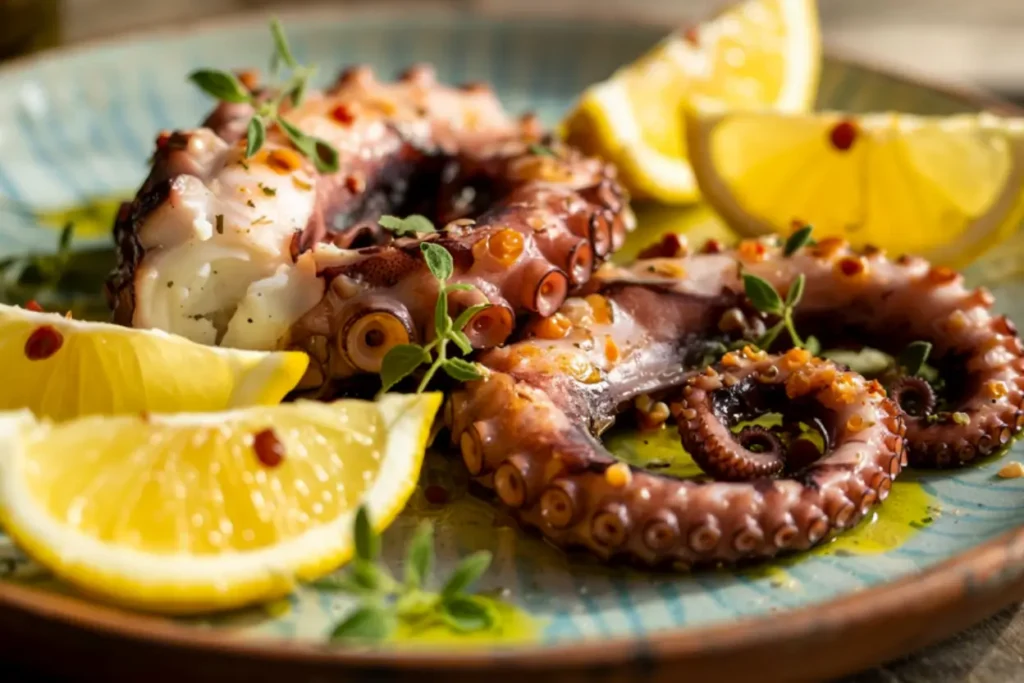
Top Tips for Perfecting Grilled Octopus with Lemon
Octopus Selection:
- Fresh octopus should have a clean ocean smell with no fishy odor. The skin should be shiny and smooth.
- Don’t be afraid of frozen octopus—many chefs prefer it as the freezing process helps break down tough fibers.
- Smaller octopus (2-3 pounds) tends to be more tender than larger specimens.
- Pre-cleaned octopus saves time, but check to ensure the beak has been removed.
Tenderizing Techniques:
- The slow-simmering method in this recipe is foolproof, but there are alternatives:
- Add a wine cork to the simmering liquid—an old Mediterranean trick some swear by
- Massage the octopus with coarse salt for 5 minutes before cooking
- For extremely tender results, try pressure cooking for 15-20 minutes instead of simmering
- Never boil vigorously—a gentle simmer is key to tenderness
Grilling Secrets:
- Ensure your grill is very hot before adding the octopus—this creates the perfect char without overcooking
- Don’t move the tentacles too frequently during grilling; let them develop char marks
- If you don’t have an outdoor grill, a cast-iron grill pan works excellently
- Keep pieces relatively uniform in size to ensure even cooking
Flavor Variations:
- Add 1 tablespoon of smoked paprika to the marinade for a Spanish-inspired flavor
- Include 1-2 tablespoons of chopped preserved lemon for an intensely lemony North African twist
- Try fresh oregano and mint instead of thyme for a different herb profile
- For a spicier version, increase the red pepper flakes or add a minced fresh chili to the marinade
Storing and Reheating Tips
Storage:
- You can store cooked octopus in an airtight container in the refrigerator for up to three days.
- For the best flavor, store with a drizzle of olive oil to keep it moist.
- If you’ve simmered the octopus but haven’t grilled it yet, it can be refrigerated for up to 2 days before grilling.
- The marinade can be prepared up to 24 hours ahead and kept in the refrigerator.
Freezing:
- Grilled octopus can be frozen for up to 1 month, though the texture may change slightly.
- Wrap tightly in plastic wrap, then aluminum foil, or place in an airtight container.
- Thaw overnight in the refrigerator before reheating.
Reheating:
- The best way to reheat grilled octopus is briefly on a hot grill or grill pan, just long enough to warm through (about 1-2 minutes per side).
- Alternatively, warm in a 350°F (175°C) oven for 5-7 minutes, being careful not to dry it out.
- Avoid microwaving if possible, as it can make the octopus tough and rubbery.
- Consider serving leftover octopus cold or at room temperature in a salad—it’s delicious this way and eliminates any risk of toughening during reheating.
Making Ahead for Parties:
- You can complete the simmering step a day ahead and store the octopus in the refrigerator.
- You can also fully prepare and grill the octopus ahead of time, then serve it at room temperature, which is traditional in many Mediterranean countries.
- If serving cold, brighten the flavors with an extra squeeze of fresh lemon juice and a drizzle of olive oil just before serving.
With this detailed guide, you now have all the tools to master the art of Grilled Octopus with Lemon. What once seemed like a daunting restaurant-only dish is now within your reach. The combination of tender, smoky octopus with bright citrus, herbs, and olive oil creates a Mediterranean masterpiece that’s sure to impress. Don’t be surprised if this becomes one of your signature dishes for special occasions!
click here to follow me on pinterest
Grilled Octopus with Lemon Recipe: How to Master in 4 Steps
Cuisine: MediterraneanDifficulty: Intermediate4-6
servings30
minutes55
minutes350-400
kcalThis dish features tender, smoky grilled octopus infused with aromatic herbs, garlic, citrus, and Mediterranean flavors. The octopus is first simmered with wine, vinegar, and spices for optimal tenderness, then charred to perfection on the grill and dressed with a vibrant lemon-herb vinaigrette. Finished with briny olives, capers, and a drizzle of quality olive oil, it’s a rustic and elegant seafood centerpiece.
Ingredients
2-3 lb (1-1.5 kg) fresh or frozen whole octopus, cleaned
1 cup dry white wine
1 onion, quartered
4 cloves garlic, smashed
2 bay leaves
1 tablespoon black peppercorns
1 lemon, halved
1/4 cup white vinegar
2 tablespoons kosher salt
1/3 cup extra virgin olive oil
4 cloves garlic, finely minced
Zest of 1 lemon
2 tablespoons fresh lemon juice
2 tablespoons fresh oregano, chopped (or 2 teaspoons dried)
1 tablespoon fresh thyme leaves
1 teaspoon red pepper flakes (adjust to taste)
1 teaspoon kosher salt
1/2 teaspoon freshly ground black pepper
2 lemons, cut into wedges
2 tablespoons high-quality extra virgin olive oil for drizzling
Flaky sea salt (such as Maldon)
Fresh oregano or parsley leaves for garnish
1 tablespoon capers, rinsed and roughly chopped
1/4 cup Kalamata olives, pitted and halved
Instructions
- Simmer the Octopus Until Tender
Thaw and clean the octopus thoroughly. In a large pot, combine wine, onion, garlic, bay leaves, peppercorns, lemon, vinegar, and salt with enough water to fill halfway. Bring to a simmer. Dip tentacles 3 times to curl, then submerge the whole octopus. Simmer gently for 45–90 minutes until tender. Let cool in the cooking liquid for 30 minutes, then remove and pat dry. - Marinate for Maximum Flavor
Whisk together olive oil, garlic, lemon zest and juice, oregano, thyme, red pepper flakes, salt, and pepper. Cut the octopus into tentacles and optional head pieces. Coat well in marinade and let sit for 30 minutes at room temp or up to 2 hours in the fridge (bring to room temp before grilling). - Grill to Charred Perfection
Heat grill to high (450–500°F). Oil the grates. Grill octopus for 3–4 minutes per side until charred. Baste occasionally with reserved marinade. Remove once heated through with a nice char, don’t overcook. - Garnish and Serve Mediterranean-Style
Transfer to a platter, drizzle with quality olive oil, fresh lemon juice, and sprinkle with flaky sea salt. Garnish with herbs, capers, and olives. Serve warm or at room temperature with lemon wedges on the side.
Notes
- Grilled octopus is a staple across Mediterranean coastlines, and while it may seem intimidating, the key is a slow, gentle simmer to tenderize the flesh before grilling. The combination of wine, vinegar, and aromatics in the cooking liquid adds depth, while the finishing lemon-herb oil brings brightness. The capers and olives add salty, savory punches that round out the dish. Serve with warm, crusty bread or a light salad for a perfect coastal meal.


